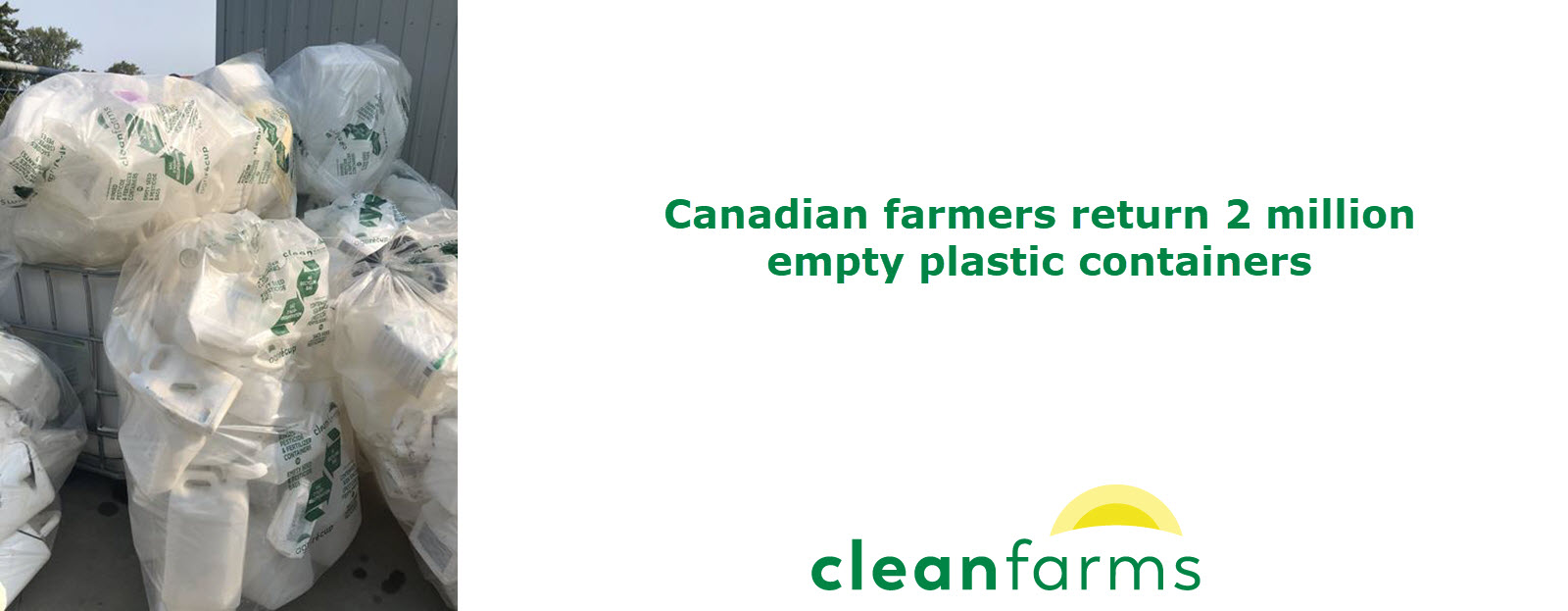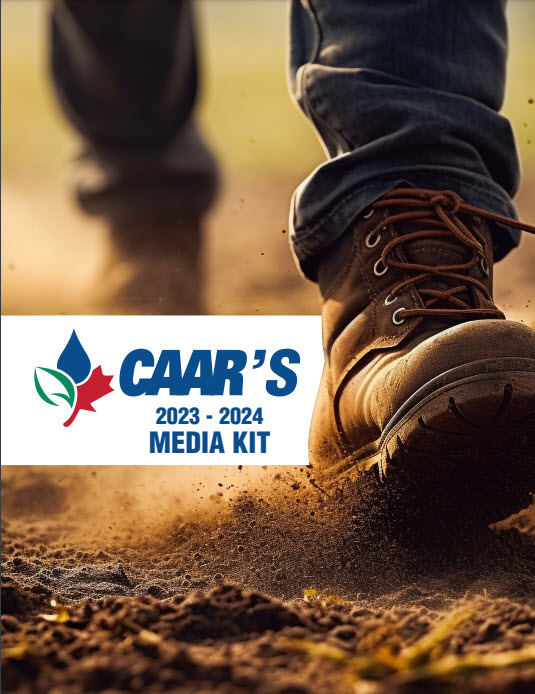Canadian farmers brought more than 2M empty plastic pesticide and fertilizer containers 23L and smaller to Cleanfarms collection sites.
On Saturday, April 22, 2023, Canadians and the world celebrated Earth Day. Agriculture is often unjustly criticized for its negatives impacts on the environment. If any group understands the impacts of climate change it is the agriculture industry.
Earth day focuses on how people can adopt one initiative that when compounded by others doing the same thing, can achieve significant outcomes. One such action that many Canadian farmers take is recycling agricultural plastics. Through their participation in Cleanfarms’ agricultural packaging and products recycling programs, Canadian farmers demonstrate their commitment to land stewardship and caring for the environment.
This practice goes beyond just one day each year. For example, in 2022, Canadian farmers brought more than 2M empty plastic pesticide and fertilizer containers 23L and smaller to Cleanfarms collection sites.
The plastic is destined to be repurposed into new products some of which will be used on farms, such as flexible drainage pipe, fence posts, composite dimensional lumber used in industrial construction, plastic pallets, guard rails, and parking lot curb stop. Last year's collection numbers surpassed those of 2021 by over 200,000 units.
“We’re marking Earth Day and Earth Week by kicking off our 2023 plastic container recycling program,” says Barry Friesen, Executive Director of Cleanfarms. “By May 1, 1,500 plus of our collection sites across Canada will be accepting empty, single-use pesticide and fertilizer containers and other items from farmers again, and many already are. Earth Day is also a great time to recommit to our goal of working to divert all ag plastic waste from landfill and into a circular economy.”
The average recovery rates for pesticide and fertilizer containers 23L and smaller is 77%.
Farmers Have More Options to Manage ‘End of Life’ Ag Products and Packaging
Cleanfarms is expanding the number of programs targeting agricultural plastic materials as well as other products used in Canada’s ag industry. Farmers are encouraged to check if they have ag materials that they haven’t recycled previously that can now be returned to a collection site. Beyond containers 23L and smaller, Cleanfarms programs include:
- a Canada-wide recycling program for large non-deposit plastic totes and drums for pesticides and fertilizers
- recycling programs for grain bags and baler twine in the Prairie provinces with a pilot also in British Columbia
- a Canada-wide collection and disposal program for unwanted pesticides and old, obsolete livestock and equine medications, and
- a safe disposal program for seed and pesticide bags and inoculant bags across most provinces.
Ongoing growth in collection volumes of these materials underscores farmers’ willingness to adopt new practices when environmentally preferred management options are available to them. Results of the pilot program to collect empty seed, pesticide and inoculant bags across the Prairies led to a Cleanfarms decision to transition the pilot into a permanent program at the end of last year.
In addition to these programs, Cleanfarms operates pilot projects across the country to assess how to shape new programs down the road for ag materials such as baler twine, bale wrap, silage wrap and silage tarps. The pilots are the result of collaboration from many partnered organizations, collection site staff, transporters, processors, and farmers, and are vital to achieving Cleanfarms’ long-term goal of eliminating ag waste from the environment.
Regarding Cleanfarms’ many programs and pilots, Friesen says, "Seeing stakeholders across sectors come together to do what's right for the planet motivates our team. Most importantly, the impact of the effort invested by our partners and program participants contributes to the work that is being done to address climate change.”
Cleanfarms is an agricultural industry stewardship organization that contributes to a healthier environment and a sustainable future by recovering and recycling agricultural and related industry plastics, packaging and products. It is funded by its members in the crop protection, seed, fertilizer, animal health medication and grain bag industries. It has staff located in Lethbridge, Alberta; Moose Jaw, Saskatchewan; Winnipeg, Manitoba; Etobicoke, Ontario; and St-Bruno, Quebec.
Related Articles
- Canadian fertilizer and the new insect and lightning alternatives Could lightning-derived technology or cricket frass be a new fertilizer option for manufacturers? By Andrew Joseph, Editor It’s spring, a time when crop farmers and retailers think profoundly about fertilizer—the...
- Innovation drives improved sustainability A comparison of Canadian versus European approaches. Canadian agriculture has embraced innovative technologies and products, something that has been achieved through an efficient regulatory framework and widespread a...
- 2024 Crop Input Market Predictions for Canada According to FCC, despite the backdrop of 2023 droughts and global issues, Canada's 2024 crop input market faces diverse challenges. Here’s a brief on what to expect. The Canadian agricultural scene is buzzing wit...
- Market insights on nitrogen fertilizers Future Market Insights is predicting the demand for nitrogen fertilizer additives will continue to increase, and the prices of nitrogen fertilizer additives are expected to grow moderately. However, the complexit...
- PSAC Strike Impacts TDG Services Transport Canada has advised CAAR that there could be possible delays in the Transportation of Dangerous Goods Program Services. Transport Canada advises the strike could cause delays in some of Transportation o...
 How to resolve AdBlock issue?
How to resolve AdBlock issue? 


Join the discussion...
You must be logged in as a CAAR member to comment.
Report
My comments